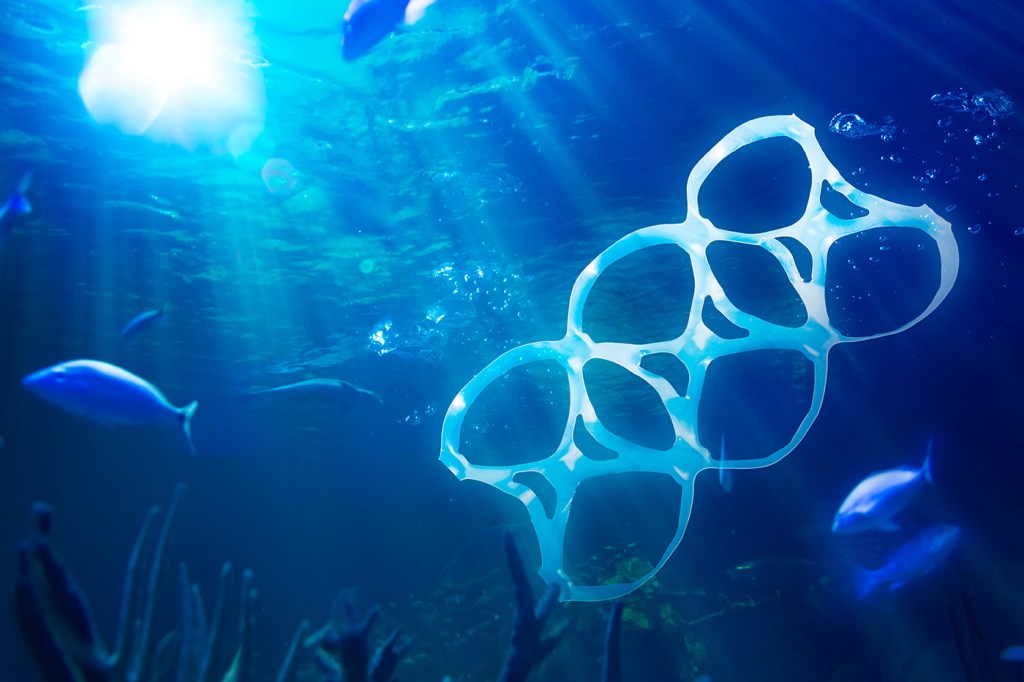Three ways the Northeastern community is addressing ocean plastics pollution

World Oceans Day is Wednesday, and events held around the world will celebrate the planet’s oceans and raise awareness of the ways society can honor, protect, and conserve them. This year’s theme of “Healthy Oceans, Healthy Planet” is meant to promote the prevention of marine plastic pollution.
Students, faculty, and staff at Northeastern are engaged in numerous research projects across many disciplines and other efforts around climate change, marine science, and urban coastal sustainability—particularly through the Marine Science Center in Nahant, Massachusetts. Here are three ways members of the Northeastern community are already focused on ocean plastic pollution.
Visualizing the problem
Skye Moret has devoted much of her scientific research over the past 10 years to studying ocean plastics—an issue she first encountered while sailing the Atlantic Ocean and Caribbean through the SEA Semester program in Woods Hole, Massachusetts. Her work, which has been published in Science and other journals, has helped to instigate the wave of marine debris research that exists today. Moret, MFA’16, recently graduated from Northeastern’s Information Design and Visualization graduate program, through which she learned new visual ways of communicating her work to engage and inspire non-scientific audiences. One of her projects, titled “Plastic Where It Shouldn’t Be,” was a data visualization of marine plastic pollution collected by nearly 9,500 trawling nets—including those from her SEA Semester trips—between 1986 and 2013. It even caught the attention of The Boston Globe. Later this month, Moret will discuss the complexities of ocean plastic pollution research at the Indexical Design Symposium at Northeastern.

Data visualization by Skye Moret, MFA’16
Sensing a solution
At RISE:2015, Ethan Edson presented his senior thesis project—“Mantaray,” a sensor that could be affixed to an ocean vessel and detect plastics levels in the sea. Like Moret, Edson was inspired from participating in the SEA Semester program. He was studying bacteria growth on microplastics collected by dragging a net behind the vessel and realized that there had to be a better way. Edson is continuing this project, now as a research technician at Northeastern’s Marine Science Center in professor Mark Patterson’s lab. Earlier this year, he received a grant from the Schmidt Family Foundation to support the development of a second prototype and move closer to commercialization. He’s currently working on making the device lighter, smaller, and more power efficient and improving upon its optical sensor to more clearly distinguish between plastic and marine life floating on or near the ocean’s surface. “As more plastic makes its way into our oceans, it will only become more of a problem for our ecosystem,” said Edson, S’15. “We need to stay ahead of the curve on developing ways to monitor this issue going forward.”

Ethan Edson, S’15, with an early version of his Mantaray sensor prototype.
Turning ocean plastic into sustainable skateboards
Northeastern alumnus Ben Kneppers co-founded Bureo with an eye toward reducing plastic pollution in the ocean—specifically, discarded fishing nets. The company designs and manufactures sustainable skateboards and launched a collection and recycling program in Chile called Net Positiva that partners with local fishermen. To date, more than 50 tons of discarded nets have been pulled from the ocean and beaches. Bureo received gap funding from Northeastern’s student venture accelerator IDEA, an investment from Patagonia in 2014, and an innovation award and grant funding from the Chilean government last year. The skateboards—including a new model, The Ahi, that launched Monday—are made in part with recycled plastic and rubber, and Bureo has also launched a line of sunglasses with frames made entirely from recycled plastic. Kneppers, E’07, noted that Bureo recently launched two community projects—a community composting system and an after-school environmental education program—with money it puts aside from every pound of fishing nets collected.

Fishing nets are collected in Chile through Bureo’s Net Positiva collection and recycling program. Photo courtesy of Bureo





